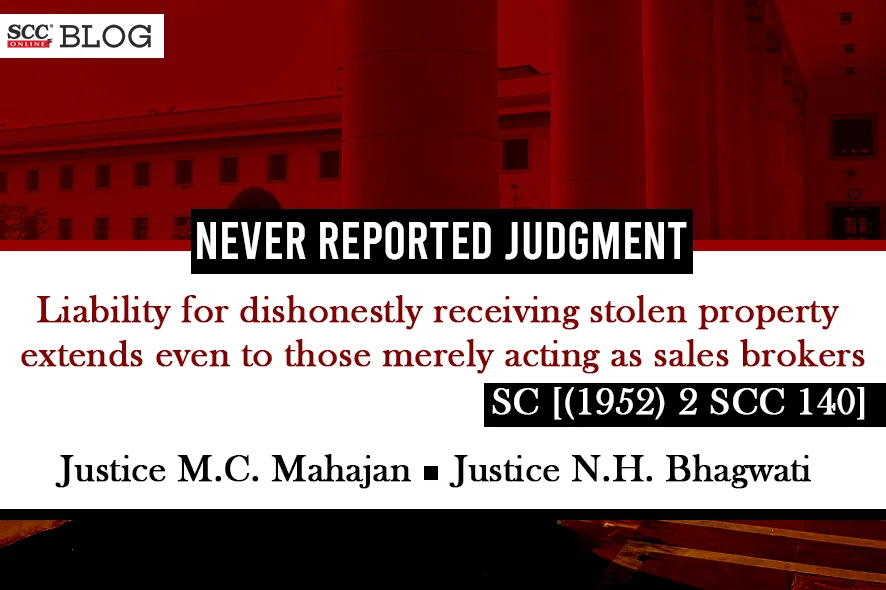Supreme Court: This is an appeal by special leave from the judgment and order of the Nagpur High Court (‘High Court’) dated 19-06-1951 dismissing the petition preferred by appellant and maintaining his conviction under Section 411 of the Penal Code, 1860 (‘IPC’). The Division Bench of M.C. Mahajan* and N.H. Bhagwati, JJ., opined that appellant’s submission that there was no material for finding that he had reason to believe that goods were stolen property was rightly rejected by the High Court as on facts and there were various sufficient circumstances present to establish appellant’s guilt. The Supreme Court, therefore, confirmed appellant’s conviction under Section 411 of the IPC.
Appellant along with three others were sent up for trial under Section 379 of the IPC for having stolen from the railway yard at Jubbulpur, five boxes of crackers from a wagon. He was convicted and sentenced to undergo rigorous imprisonment for one year. On appeal, the Sessions Judge altered the conviction to one under Section 411 of the IPC but maintained the sentence. In revision, this order was upheld and special leave to appeal was granted on the contention that there was no evidence whatsoever to prove that the goods were stolen goods.
The Supreme Court opined that there was ample material to establish that the goods in dispute had been stolen from a railway wagon at Jubbulpur railway yard. The Supreme Court took note of the appellant’s contention that he was not in possession of these goods and was merely acting as a sales broker and the goods were in actual possession of Ambika Prasad. The Supreme Court opined that this contention, even if correct, would bring his act within Section 414 of the IPC instead of Section 411 of the IPC and would make him liable for the same punishment.
The Supreme Court noted that the High Court had rightly rejected appellant’s contention that there was no material for the finding that appellant had reason to believe that the goods were stolen property. The Supreme Court observed that goods of considerable value were in the possession of a petty panwala who was securing the assistance of a cloth dealer to sell them and who had no licence to hold these goods. The Supreme Court thus opined that this circumstance was sufficient to raise the suspicion of an honest person about their origin and various other circumstances had been mentioned by the High Court which conclusively established that appellant had reason to believe that the goods were stolen property. The Supreme Court accordingly dismissed the appeal.
[Biran Lal v. State of Madhya Pradesh, (1952) 2 SCC 140, decided on 15-10-1952]
*Judgment authored by: Justice M.C. Mahajan
Note: Dishonestly receiving stolen property
The provisions relating to receiving of stolen property are given under Sections 410 to 414 of the Penal Code, 1860 (‘IPC’). Section 411 of the IPC states that whoever dishonestly receives or retains stolen property, knowing or having reason to believe that such property is a stolen one, shall be imprisoned for a term which may extend up to three years, or with fine, or both and therefore any person having belief or knowledge about any stolen property must not receive or retain it. The liability under Section 411 of the IPC arises not only for dishonest “reception” but also for dishonest “retention”. Section 414 deals with concealing and disposing of stolen property and it states that any person who voluntarily assists in concealing or disposing of that property or making away of that property which he has knowledge of or reasons to believe to be stolen property, shall be punished with imprisonment of either description for a term which may extend up to three years, or with fine, or both.
Advocates who appeared in this case :
For the Appellant: Nanak Chand, Advocate
For the Respondent: Jindra Lal, Advocate







